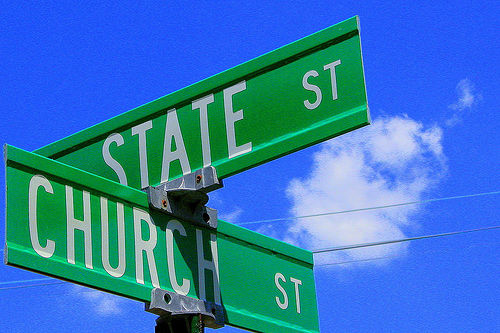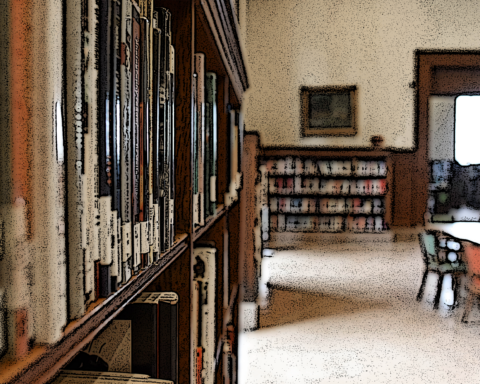Walking the Church/School Boundary

It’s a daily parade. Every morning as the sun rises over Mount Rainier, children leave the back door of Immanuel Presbyterian Church in Tacoma and walk 2 blocks up I street to Lowell elementary school.
The parade reverses direction in the afternoon. The 40 or so children in the morning and afternoon parade are leaving and returning to Prime Time Extended Learning Center. Prime Time has been at Immanuel for over twenty-five years, though the emphasis on being a learning center is quite new. In the past, it was primarily a place for children to come, snack, and play when busy parents’ schedules didn’t mesh with schools’ schedules. Recently, under a skilled director and Board chairperson, the program has expanded to include an educational component. Children still climb on the big toys, bounce balls, and enjoy snacks, but now they also do their homework and review math and science.
Children learn a lot at Prime Time, whose enrollment is at capacity, but they don’t learn about Jesus or the Bible, nor are they recruited for Immanuel’s children’s ministry program. Prime Time is a religion-free zone lodged in a growing Presbyterian church. Christian faith compels us to support this program, and that same Christian faith leads us to make it intentionally non-religious.
___________________________________________
Prime Time is a religion-free zone so that it affirms the separation of church and state and so that it embodies Jesus’ teaching to love our neighbors.
___________________________________________
We have created the religion-free zone at Prime Time for two compelling reasons. The first is constitutional. Immanuel, like most Presbyterian congregations, takes seriously the separation of church and state. We affirm this for the well-being of both sides of the equation – the church and the state. Prime Time has a strong working relationship with the staff at the neighboring elementary public school. They recommend our program to parents seeking before- and after-school care and additional learning opportunities for their children. The school could not do this if we engaged in religious teaching. It is not appropriate for a public employee to use that capacity to encourage or promote one religious viewpoint. Sending a child to a church-based program where they would receive religious instruction would intentionally or unintentionally be promoting religion. Those of us who work with Prime Time at Immanuel want it to be a resource for all children – and we want parents to know that our program will not undermine or conflict with the way they approach matters of faith and religion at home.
 Prime Time is a religion-free zone so that it affirms the separation of church and state and so that it embodies Jesus’ teaching to love our neighbors. As followers of Jesus, we believe we are called to be a positive presence in our city, to enact the love and justice of Jesus in concrete ways. One such way is helping care for children. We want to be able to care for our community’s children while simultaneously respecting a family’s right to make determinations around religious faith and practice. This viewpoint echoes the Presbyterian Church (U.S.A.)’s 2006 comprehensive social witness policy on public education, Loving our Neighbors, approved by the 219th General Assembly. The policy states, “any attempt (in school or a pre-post school program recommended by the school) to teach one particular religious worldview is a failure to love and respect the neighbor who has a different religious viewpoint or has rejected any religious viewpoint.”
Prime Time is a religion-free zone so that it affirms the separation of church and state and so that it embodies Jesus’ teaching to love our neighbors. As followers of Jesus, we believe we are called to be a positive presence in our city, to enact the love and justice of Jesus in concrete ways. One such way is helping care for children. We want to be able to care for our community’s children while simultaneously respecting a family’s right to make determinations around religious faith and practice. This viewpoint echoes the Presbyterian Church (U.S.A.)’s 2006 comprehensive social witness policy on public education, Loving our Neighbors, approved by the 219th General Assembly. The policy states, “any attempt (in school or a pre-post school program recommended by the school) to teach one particular religious worldview is a failure to love and respect the neighbor who has a different religious viewpoint or has rejected any religious viewpoint.”
I am fortunate that in my work at Immanuel, folks have clearly understood that loving and respecting our neighbors means that Prime Time must be a religion-free zone. I have encountered some resistance to this approach in other contexts. For example, an another church, when we began an after-school tutoring program in conjunction with an under-achieving school, one volunteer came to the session with colorful tracts about Jesus.
___________________________________________
As followers of Jesus, we believe we are called to be a positive presence in our city, to enact the love and justice of Jesus in concrete ways. One such way is helping care for children.
___________________________________________
After the session meeting we made an appointment. I shared my concern with the volunteer and noted a neighborhood near us where the primary religious community was Buddhist. I asked her how she would feel if her grandson needed tutoring, was sent to a Buddhist temple for help, and while there received materials about how Buddhism is superior to Christianity. “I wouldn’t like it,” she responded. By the end the conversation, we had come to the same place, though by different routes. “I guess I won’t talk about Jesus,” she said, “but just love the kids and trust the Holy Spirit to work.” It’s not my language, and yet we both understood: “Do unto others’ grandchildren as you would have others do unto your grandchildren.”
 At Immanuel, we believe that teaching about Christian faith and engaging in specific Christian spiritual practice is the heart of our work within the congregation. It provides the context for the way we live in our city. We engage our community – corporately and individually – in a manner that often does not have an explicit religious component, but that engagement is deeply rooted in our faith. We act with love and hospitality, doing good things for the community because they are good things to do. Along with Prime Time, we support the Broadway Center for the Performing Arts, PRIDE week, local food banks, and a Habitat for Humanity chapter.
At Immanuel, we believe that teaching about Christian faith and engaging in specific Christian spiritual practice is the heart of our work within the congregation. It provides the context for the way we live in our city. We engage our community – corporately and individually – in a manner that often does not have an explicit religious component, but that engagement is deeply rooted in our faith. We act with love and hospitality, doing good things for the community because they are good things to do. Along with Prime Time, we support the Broadway Center for the Performing Arts, PRIDE week, local food banks, and a Habitat for Humanity chapter.
These partnerships are not occasions for us to explicitly promote Christian faith as much as occasions to live the faith. We have discerned that this is how Christ is calling us to ‘love our neighbors’ in 21st-century Tacoma. One consequence of this is the increased visibility of the congregation, as well as a general (and accurate!) perception that we care about our city. This naturally leads to more people coming through our doors on Sunday morning. Obviously we are pleased by that, but our main goal is to care for the place where we are located, to extend hospitality.
___________________________________________
Despite what some extremists today will claim, an educated mind is not a threat to faith. In fact, in the earliest days of the church in North America, most Christians believed that an educated mind would protect believers against being led astray.
___________________________________________
Presbyterians have a long history of support for public education. We consider it part of our following Jesus, who was (at the least!) a great teacher. In the colonial days of this nation, we helped establish free public schools. Despite what some extremists today will claim, an educated mind is not a threat to faith. In fact, in the earliest days of the church in North America, most Christians believed that an educated mind would protect believers against being led astray.

Photo Credit: Immanuel Presbyterian Church, Tacoma
The ‘Old Deluder Satan Law’, passed in the Commonwealth of Massachusetts in 1647, required communities to establish and support schools. The law opens with these words, “It being the chief project of the old deluder Satan, to keep men (sic) from knowledge of scripture. It is therefore ordered…” [1] Three hundred years, later the role of quality public education remains essential to the well-being of the democracy and is a way to appreciate the complexity, wonder, and majesty of creation.
Apart from supporting extended learning centers to provide child care and support for learning, Christian communities support schools by holding school board candidate forums, by recognizing the beginning of the school year in worship – introducing educators and students and praying for them. We support schools by working to change inequality in education and by celebrating achievements in our schools. We hear all too often about our flawed or even failing public schools, but how often do we consider the fact that it very well may be we who are failing them?
Yes, public schools face enormous challenges, yet many teachers are still right there in the trenches, teaching out of a deep commitment to knowledge and their students. They should be affirmed and celebrated – in the church and outside of it!
Driving to my office, I see the Prime Time parade from church to school. Those children are the future; they are made in the very image of God. Loving them as my neighbors means doing all I can do – and all we can do as a community – to give them quality public education, for a future bright with possibilities and free from fear.
_________________________________________
[1] The Old Deluder Act (1647) From Records of the Governor and Company of the Massachusetts Bay in New England (1853), II: 203.
*****
AUTHOR BIO: Rev. Dave Brown is the Pastor of Immanuel Presbyterian Church, Tacoma WA. He served as staff to the NCCC committee on Public Education and literacy. Rev. Brown was on the task force that wrote Loving Our Neighbors: Equity and Quality in Public Education, a social witness policy document approved by the 219th General Assembly. He is also known nationally in the blues music community for Immanuel’s Blues Vespers.
Read more articles in this issue: Pedagogy for the Distressed!
Read more articles in the “Strategies and Solutions” section!






Unbound Social